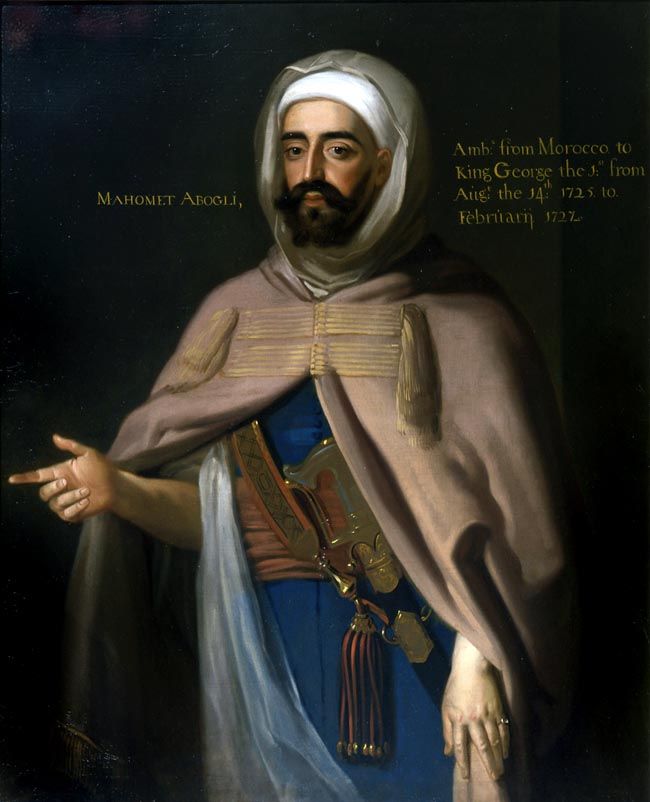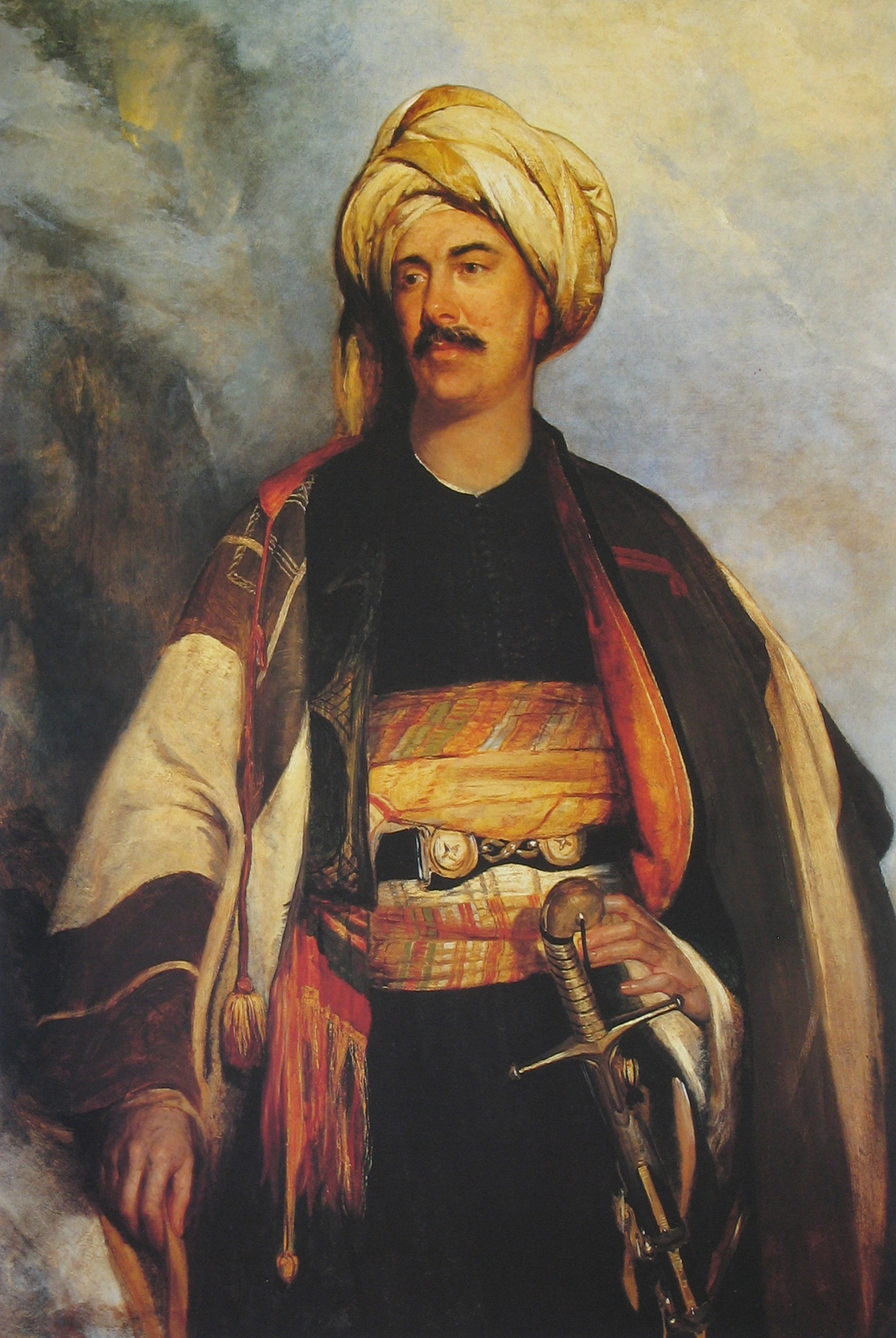محمد
بن علي أبغالي
Mohammed
Ben
Ali Abgali
Meknes,
August 19, 1725
August 19, 1725
Ismāʿīl ibn Sharīf, the aging Sultan of Morocco, watches the advancing clouds with concern. The memory of a humiliating defeat returns obsessively to his thoughts. Three years ago, the vast armada he sent to invade Spain sank in a massive storm. Now, he watches as the boat carrying his ambassador, Mohammed Ben Ali Abgali, sails precariously towards the Kingdom of Great England under a canopy of dark grey clouds.
Ismāʿīl looks to the sky and whispers:
Ismāʿīl looks to the sky and whispers:
Since his appointment in 1720 by the Alaouite emperor, Mohamed Ben Ali Abgali has gained substantial recognition in Morocco. He now finds himself on this magnificent ship, embarking on a journey to Europe. However, rather than focusing on the commission to encounter King George I, Mohamed will also dedicate his efforts to meeting with distinguished figures of London's cultural elite and revelling in the cultural offerings of the flourishing imperial capital. After all, his trip is not so much about seeing as it is about being seen.
Upon settling in London, Mohammed is particularly impressed with the plays of English dramatist, poet and writer Nicholas Rowe, as well as by the offerings of the highly fashionable Commedia dell’ Arte.
On advice from his new friend Martin Folkes, the grand tourist, anti-slavery advocate, mathematician, astronomer and recently appointed Deputy Master of the Premier Grand Lodge of England, the young Moroccan diplomat does not miss the opportunity to have his portrait painted. To that end, he hires the Polish artist Enoch Seeman, painter to the royal court and one of the most famous portraitists at the time. Seeman’s finished portrait shows the ambassador in full oriental splendour, in keeping with the look he has been sporting for the many artistic and political functions where he has taken to networking. He has become so popular within English cultured elites that, thanks to Folkes’ influence, in early 1727 he is awarded the Fellowship of the Royal Society, one of the most prestigious awards granted to individuals who are judged to have made a substantial contribution to the improvement of scientific knowledge.
Meanwhile, back in Meknes, Ismā’il prays in the mosque. He is renowned for publicly practising ceremonies, ablutions, fasts and feasts with scrupulous Islamic precision. As he often does on his way back from the mosque, he asks for the Trinitarians to be brought into his court. This Friday is not an exception. Their long debates on theology, astronomy and dogmatism are famous in the scholarly circles around the Sultanate. Ismā’il is not particularly talkative this evening, however. A strange pain in his stomach is worrying him.
Upon settling in London, Mohammed is particularly impressed with the plays of English dramatist, poet and writer Nicholas Rowe, as well as by the offerings of the highly fashionable Commedia dell’ Arte.
On advice from his new friend Martin Folkes, the grand tourist, anti-slavery advocate, mathematician, astronomer and recently appointed Deputy Master of the Premier Grand Lodge of England, the young Moroccan diplomat does not miss the opportunity to have his portrait painted. To that end, he hires the Polish artist Enoch Seeman, painter to the royal court and one of the most famous portraitists at the time. Seeman’s finished portrait shows the ambassador in full oriental splendour, in keeping with the look he has been sporting for the many artistic and political functions where he has taken to networking. He has become so popular within English cultured elites that, thanks to Folkes’ influence, in early 1727 he is awarded the Fellowship of the Royal Society, one of the most prestigious awards granted to individuals who are judged to have made a substantial contribution to the improvement of scientific knowledge.
Meanwhile, back in Meknes, Ismā’il prays in the mosque. He is renowned for publicly practising ceremonies, ablutions, fasts and feasts with scrupulous Islamic precision. As he often does on his way back from the mosque, he asks for the Trinitarians to be brought into his court. This Friday is not an exception. Their long debates on theology, astronomy and dogmatism are famous in the scholarly circles around the Sultanate. Ismā’il is not particularly talkative this evening, however. A strange pain in his stomach is worrying him.
The next day, March 22, 1727, at the age of 81 and after 55 years of reign, Moulay Ismail ibn Sharif, the greatest Sultan of Morocco, dies from an abscess in his lower abdomen. After his death, the Black Guards — the Abid al-Bukhari — launch a rebellion, and the empire immediately falls into civil war.
From the deck of the ship that is carrying him back home at full speed, Mohammed Ben Ali Abgali watches the black clouds crowd the sky and wonders, gloomily, what they must portend.
From the deck of the ship that is carrying him back home at full speed, Mohammed Ben Ali Abgali watches the black clouds crowd the sky and wonders, gloomily, what they must portend.

لم نكن يومًا
حديثين
We have
never been
modern
لم نكن يومًا
حديثين
We have
never been
modern
Cairo,
August 19, 1825
August 19, 1825
On a suffocating Caireen afternoon, one hundred years after Mohammed Ben Ali Abgali’s departure for England, the young azharite Rifa'a al-Tahtawi is getting ready to meet Hassan El-Attar, his mentor.
Hassan has excellent news for him: on his recommendation, Rifa'a has been chosen to be the chaplain of the first al-Rihla Safariya (or educational mission) of Egyptian students to Europe where they will conduct research on the arts, sciences and political models of the 'enlightened' continent.
Despite the good news, Rifa'a feels uneasy. The thick heat of this summer evening is suffocating and Rifa'a can't help remembering his turbulent boat trip down the Nile ten years ago, when he and his mother had to leave Tahta, their small market village in Upper Egypt, to look for better fortune in Cairo after his father’s death. Their departure was to mark a new beginning after a period of brutal changes. While they had enjoyed great respect within Tahta’s community, his family, like so many others, had also witnessed a dramatic reversal of fortunes with the introduction of Muhammad Ali's modernising land reforms. These had included the abolition of the iltizam, the tax farming system. Rifa’a’s father was one of the tax farmers whose property had been expropriated. As a result, Rifa'a’s family had been reduced to poverty overnight.
‘The path to Modernity is ambiguous,’ Rifa'a muses. ‘While Mohammed Ali reduced my family to ruins, he is now giving me the opportunity to travel to Paris.’

What Rifa'a does not yet know is that this upcoming trip to the capital of France will have an indelible impact on his career. Upon his return five years later, Rifa'a al-Tahtawi will set himself the task of integrating Islamic principles with European social theories. Today, this work is recognised as one of the most important contributions to the Nahda, the Arab Enlightenment, which is itself remembered as one of the most prolific ages in Arabic intellectual history.
Indeed, Rifa'a went on to play a fundamental role in the nationwide effort to modernise the country’s infrastructures as well as its education system. He undertook a career in writing and translation, founding the School of Languages in 1835. As part of his mission, Rifa'a supervised translations from French to Arabic, on topics ranging from sociology and history to military technology. These efforts are nowadays considered to represent the second great translation movement in Arab intellectual history, comparable only to the Golden Age of art and sciences that took place during the Umayyad and Abbasid dynasties, back in the 8th and 9th centuries. His translations went on to become as popular as his writings, among which the travelogue al-diwan al-nafis bi-iwan Baris, or The extraction of pure gold in the abridgement of Paris, is the most popular.
His achievements soon acquired ambiguous status, however. The School of Languages introduced Egyptian audiences to the Arab Enlightenment, producing the early modern Egyptian intellectual milieu that would form the basis of grassroots mobilisation against British colonialism in Egypt. However, due to Tahtawi’s affection for French civilitas, he was accused of neglecting his roots in favour of alignment with the West. Some argued that his ideas, which were based on a particular conception of Arab liberalism, enabled a form of intellectual colonisation.
Indeed, Rifa'a went on to play a fundamental role in the nationwide effort to modernise the country’s infrastructures as well as its education system. He undertook a career in writing and translation, founding the School of Languages in 1835. As part of his mission, Rifa'a supervised translations from French to Arabic, on topics ranging from sociology and history to military technology. These efforts are nowadays considered to represent the second great translation movement in Arab intellectual history, comparable only to the Golden Age of art and sciences that took place during the Umayyad and Abbasid dynasties, back in the 8th and 9th centuries. His translations went on to become as popular as his writings, among which the travelogue al-diwan al-nafis bi-iwan Baris, or The extraction of pure gold in the abridgement of Paris, is the most popular.
His achievements soon acquired ambiguous status, however. The School of Languages introduced Egyptian audiences to the Arab Enlightenment, producing the early modern Egyptian intellectual milieu that would form the basis of grassroots mobilisation against British colonialism in Egypt. However, due to Tahtawi’s affection for French civilitas, he was accused of neglecting his roots in favour of alignment with the West. Some argued that his ideas, which were based on a particular conception of Arab liberalism, enabled a form of intellectual colonisation.
London,
August 31, 1838
August 31, 1838
It is the last day of August. Rifa'a is in his office, amongst piles of books, in the magnificent headquarters of the School of Languages. He is making the final corrections to his Parisian travelogue.
'When someone does something great or despicable, the journalist writes about it, so it becomes known both by notables and ordinary people, to encourage the person that did something right or to make the person who has done a despicable thing forsake his ways.'
That very same day, the Scottish painter David Roberts can be found waiting at the London docks, ready to sail for Egypt. His intent, like that of many other grand tourists, is to produce drawings that he can later use to produce paintings and lithographs to sell to the public back in England. David knows that Egypt — and for that matter, the Orient in general — is much in vogue, and travellers, collectors and lovers of antiquities will be keen to buy works depicting the great monuments of a decaying civilisation.
Indeed, in the late 19th - century, and following a tradition that expands into the present times, Egypt was teeming with rapacious collectors and scholars. The boundary between the two was hardly visible, it must be said. When Muhammad Ali had instituted his groundbreaking decree in 1835, prohibiting the exportation of antiquities outside of the country, Europeans had dismissed it and questioned his motives. In the main pages of the London Morning newspaper, the following biased statement had appeared:
'Not satisfied with those monopolies he has established on the living, Muhammad Ali has lately introduced one also in the kingdom of the dead.'

After a ten-month-long journey through Egypt, Nubia and the Levant, over the course of which he produces a vast collection of drawings and watercolour sketches, David Roberts receives a formal invitation to the court of Muhammad Ali Pasha in Alexandria.
Ali looks down incredulously as David approaches him, draped in Orientalist attire.
He thinks to himself:
‘After all, maybe they have never been modern... '
Ali looks down incredulously as David approaches him, draped in Orientalist attire.
He thinks to himself:
‘After all, maybe they have never been modern... '
Upon Roberts' return to Edinburgh in 1840, he is warmly fêted. The next year, after several exhibitions of his Orientalist sketches, he is nominated to the Royal Academy. That same year, Rifa'a al-Tahtawi is made Director of the European library of Qasr al-Ayni and is appointed Editor-in-chief of the Official Gazette, al-Waqa’i’ al-Mi sriyya, by Muhammad Ali himself.
The fates of the two men follow divergent trajectories ten years later. While David Roberts continues his Orientalist endeavours as a grand tourist in Rome, Rifa'a al-Tahtawi, victim to the vicissitudes of political life, the death of Muhammad Ali Pasha and the establishment of an anti-western Sultanate in Egypt, is sent to Sudan, as an exile. While David is painting the Venetian Ducal Palace in his comfortable studio overlooking the Lagoon, Rifa'a is translating Fénelon’s Les Aventures de Télémaque in the disease-infested swamp that was at that time Khartoum.
These are the fates of David and Rifa’a in glorious Venice and crumbling Khartoum: a celebrated Orientalist and a dismissed pedagogue.
The fates of the two men follow divergent trajectories ten years later. While David Roberts continues his Orientalist endeavours as a grand tourist in Rome, Rifa'a al-Tahtawi, victim to the vicissitudes of political life, the death of Muhammad Ali Pasha and the establishment of an anti-western Sultanate in Egypt, is sent to Sudan, as an exile. While David is painting the Venetian Ducal Palace in his comfortable studio overlooking the Lagoon, Rifa'a is translating Fénelon’s Les Aventures de Télémaque in the disease-infested swamp that was at that time Khartoum.
These are the fates of David and Rifa’a in glorious Venice and crumbling Khartoum: a celebrated Orientalist and a dismissed pedagogue.
